Key takeaways:
- Key sources for analytics news include subscription platforms like Analytics Vidhya and Towards Data Science, LinkedIn groups, and podcasts like Data Skeptic.
- Utilizing analytical tools such as Tableau, Google Analytics, and Python enhances data visualization and manipulation, leading to deeper insights.
- Engaging with industry experts through social media, webinars, and online communities fosters professional growth and provides valuable networking opportunities.
- Continuous learning via online courses allows for flexible, self-paced education, enabling the application of new skills to real-world projects.
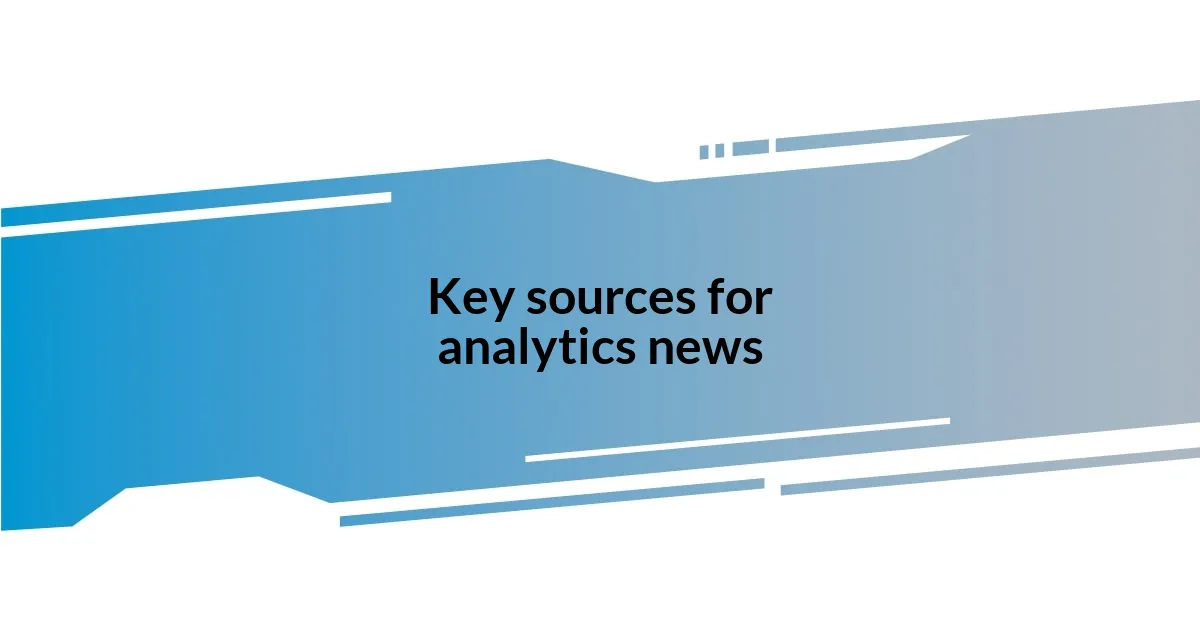
Key sources for analytics news
When it comes to staying updated in the analytics realm, I find that subscription-based news platforms like Analytics Vidhya and Towards Data Science are invaluable. I love how they break down complex topics into easily digestible insights. Do you remember the last time a simple blog post made a complicated concept click for you? For me, it was a piece on machine learning algorithms that finally made sense after days of confusion.
Another go-to source is LinkedIn groups focused on analytics and data science. I can’t stress enough how engaging these communities can be. The discussions often dive deep into current trends, and I’ve picked up vital insights from professionals in the field. Have you ever thought about how much we can learn just from sharing experiences? It’s like a mini-conference right at your fingertips, and the networking opportunities are phenomenal.
Furthermore, I constantly turn to podcasts such as Data Skeptic or The Data Science Podcast. Listening to experts discuss their experiences while I’m on the go often inspires new ideas and concepts. Honestly, there’s something so motivating about hearing real-life applications of analytics that make the entire field feel more accessible. How do you prefer to absorb new information? For me, the combination of auditory learning and shared insights has completely transformed my understanding of analytics.
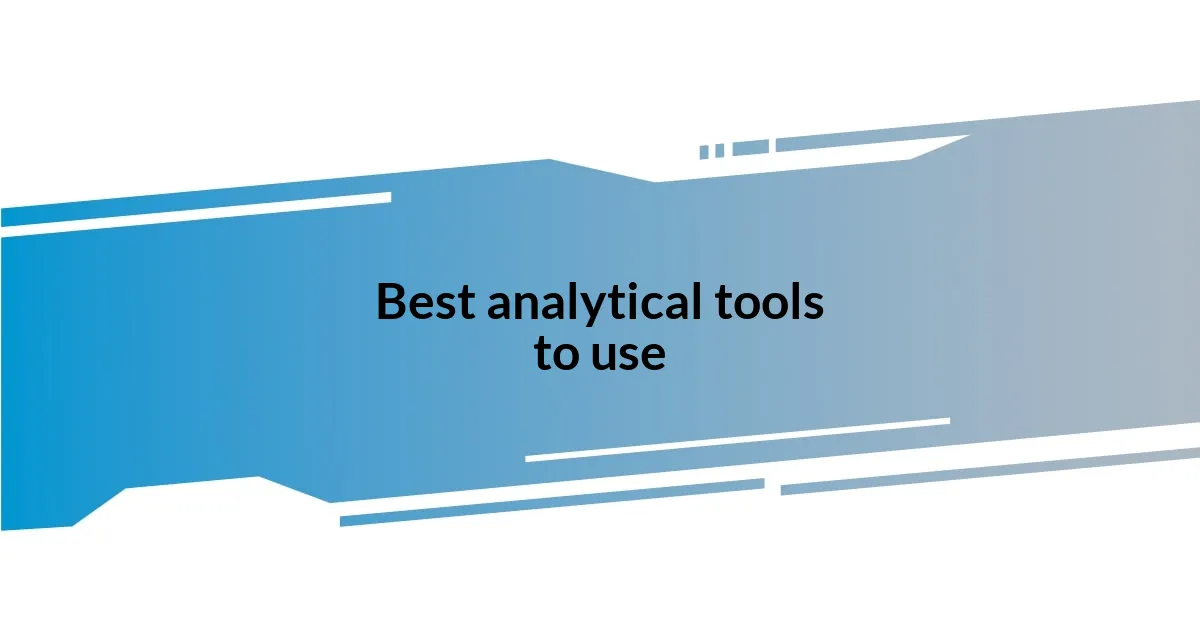
Best analytical tools to use
When it comes to analytical tools, my experience has taught me that the right software can make a significant difference. I often rely on Tableau for its intuitive data visualization capabilities. It’s fascinating how the ability to transform rows of numbers into vibrant, digestible visuals can lead to those “aha!” moments in data analysis. I remember presenting a dashboard I created for a project once; the visual impact sparked an immediate discussion that ultimately shaped our strategy.
Here’s a list of some of the best analytical tools that can help you make sense of your data:
- Tableau: Excellent for data visualization and storytelling.
- Google Analytics: Ideal for tracking and analyzing website traffic.
- R: A powerful tool for statistical analysis and data visualization with an active community.
- Python: Great for data manipulation and machine learning through libraries like Pandas and Scikit-learn.
- Microsoft Power BI: Offers robust reporting features and integration with other Microsoft products.
- SAS: Well-regarded for advanced analytics and business intelligence.
Choosing the right tool depends on your specific needs, and I find that experimenting with different ones can lead to surprising insights. Engaging with these tools isn’t just about crunching numbers; it’s about unlocking stories hidden within the data.
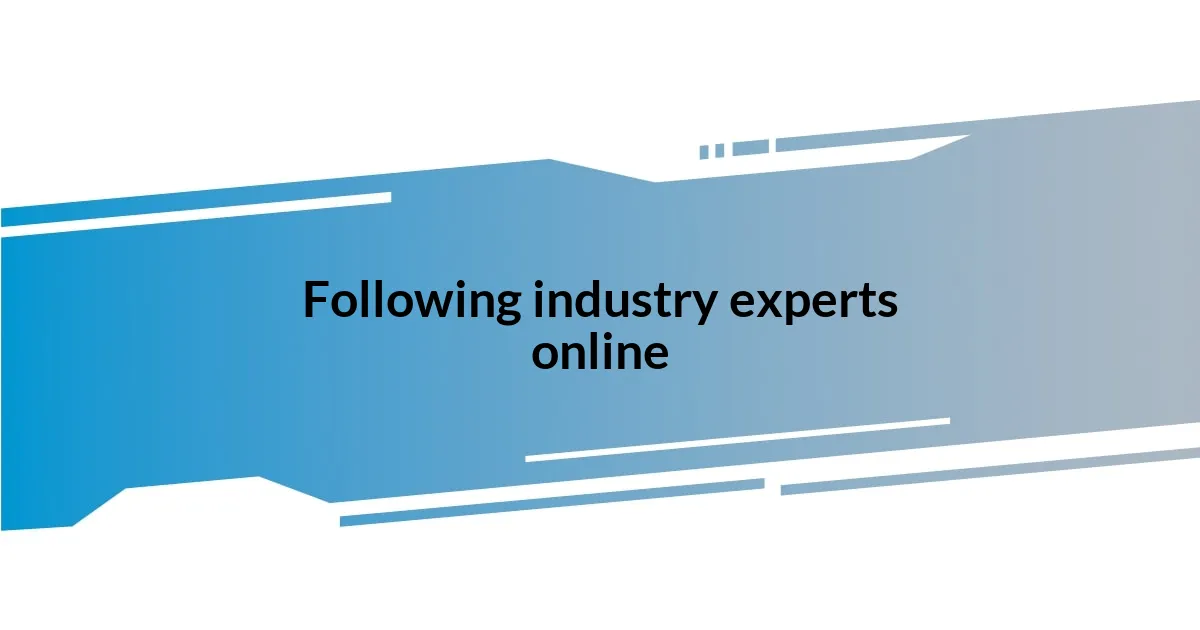
Following industry experts online
When I think about following industry experts online, I remember how transformative it can be. Engaging with insights from thought leaders on platforms like Twitter or LinkedIn has opened my eyes to trends I would have otherwise missed. I vividly recall a tweet thread from an analytics expert discussing the impact of GDPR on data collection, which not only broadened my understanding but also influenced my own approach to data privacy in projects.
In addition to following individuals, I find that webinars and online conferences hosted by these experts foster a deeper level of connection and learning. Participating in a recent webinar allowed me to directly ask questions and hear live responses from the panel of analytics gurus. It felt incredibly rewarding when one of my queries was addressed personally. That instant feedback reinforces my passion for the field.
The variety of content and perspectives that industry experts share is unmatched. From blog posts to videos, I always encounter new ways to think about analytics. I once came across a video where an expert demonstrated the use of machine learning for predictive analytics in real time. It was fascinating to see theory come alive! Those moments remind me why I stay connected to the analytics community online.
| Platform | Benefits |
|---|---|
| Quick updates, threads from experts, and engaging discussions | |
| Professional networking, group discussions, and long-form insights | |
| Webinars | Hands-on learning, direct interaction with experts, and real-time Q&A |
| Blogs | In-depth knowledge, personal anecdotes, and case studies |
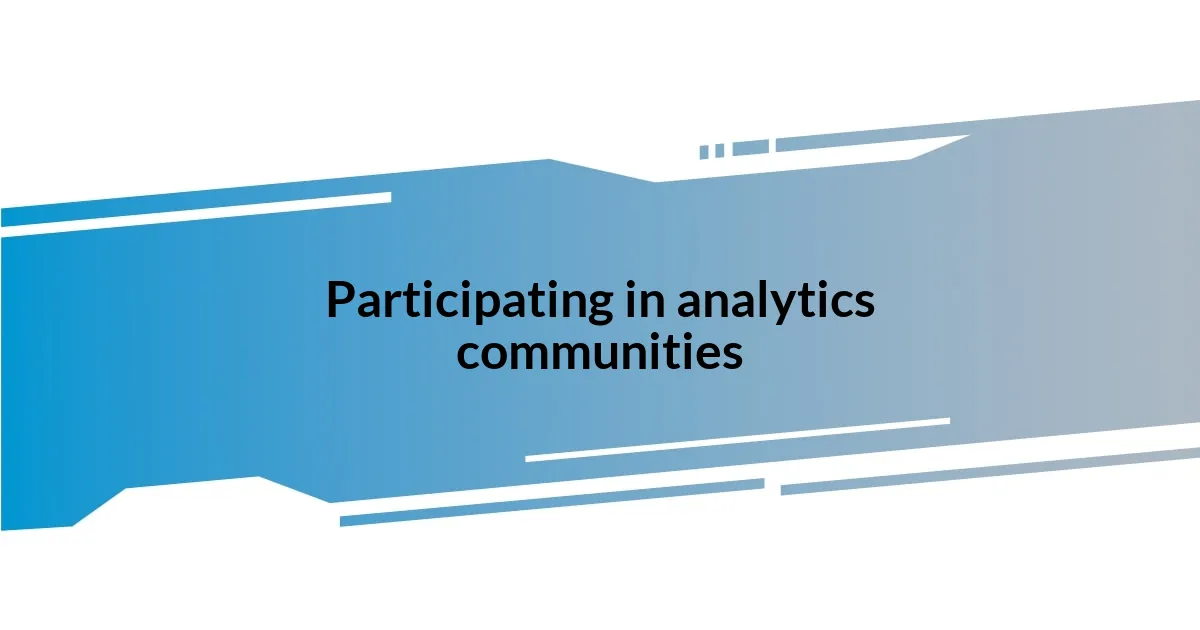
Participating in analytics communities
Being part of analytics communities has been a game-changer for me. I often find that these spaces, whether online forums or local meetups, are where I can connect with like-minded individuals who share my passion for data-driven insights. For instance, last month, I attended a community event where a fellow analyst shared their journey involving a challenging project. Listening to their experiences inspired me to tackle my own projects with renewed vigor and creativity.
I also love how these communities promote knowledge sharing. I’ve participated in numerous discussions that dug deep into technical challenges, where a simple question from me led to enlightening solutions. One time, I sought help on an advanced modeling technique that had me stumped. The responses I received not only clarified my doubts but also opened my eyes to alternative approaches I hadn’t considered. Isn’t it incredible how conversations can lead to professional growth?
Moreover, being active in these groups fosters a sense of belonging. I remember feeling a bittersweet blend of nerves and excitement when I presented my first case study to a community group. The support I received afterward was overwhelming, and it solidified my commitment to continuously learn and contribute. Knowing there’s a collective effort toward enhancing our skills makes the journey of data analytics exhilarating and rewarding.
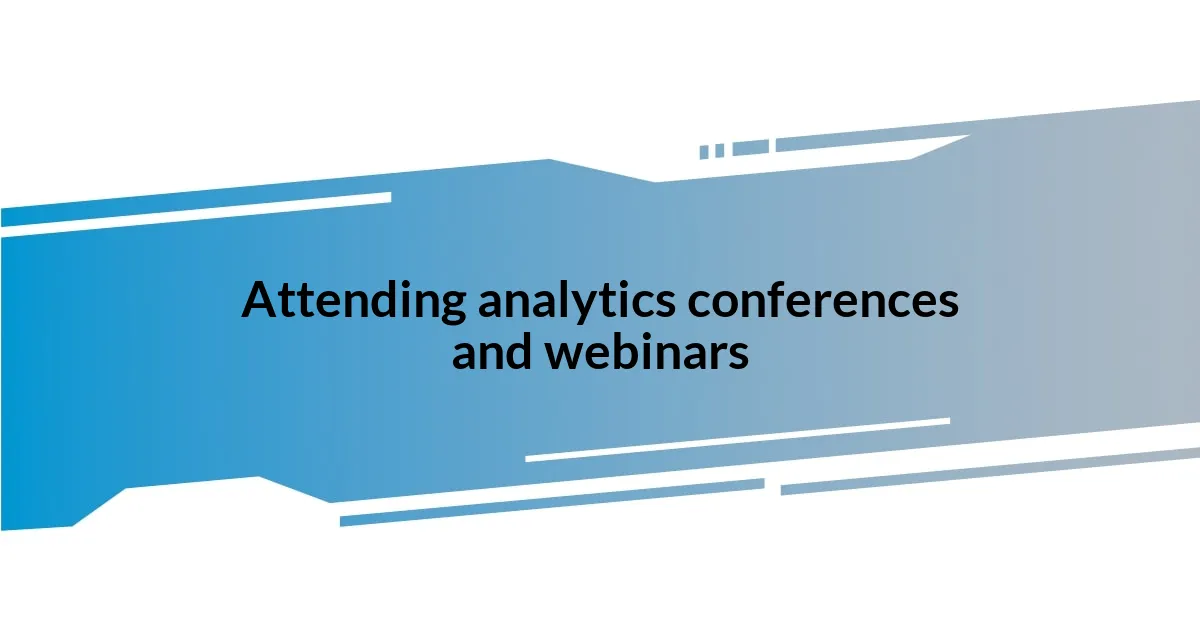
Attending analytics conferences and webinars
Attending analytics conferences and webinars has always been a highlight for me. I still remember my first analytics conference; walking into the venue, I felt a rush of excitement. The energy in the air was contagious, and the diverse range of topics being discussed gave me a sense of belonging to a larger community. Engaging face-to-face with industry pioneers not only expanded my understanding but also sparked connections that turned into valuable collaborations later on.
Webinars, on the other hand, offer a unique, accessible platform for learning. I once joined a webinar focused on data visualization techniques, and the practical exercises they included were a game changer. I found myself immediately applying the techniques discussed, even during the session! The Q&A segments are particularly enlightening; having the chance to ask specific questions and get feedback in real time is a privilege that enhances my understanding on the spot. Isn’t it rewarding to feel like your questions matter in a room full of experts?
Moreover, the networking opportunities at these events are incredible. I recall meeting a fellow analyst during a lunch break, where we dived into a deep discussion about our analytics toolkits. That conversation led to an ongoing exchange of ideas and resources that has enriched my work significantly. Connecting with others who share my interests and challenges is so impactful—doesn’t it feel wonderful to find that shared passion and support?
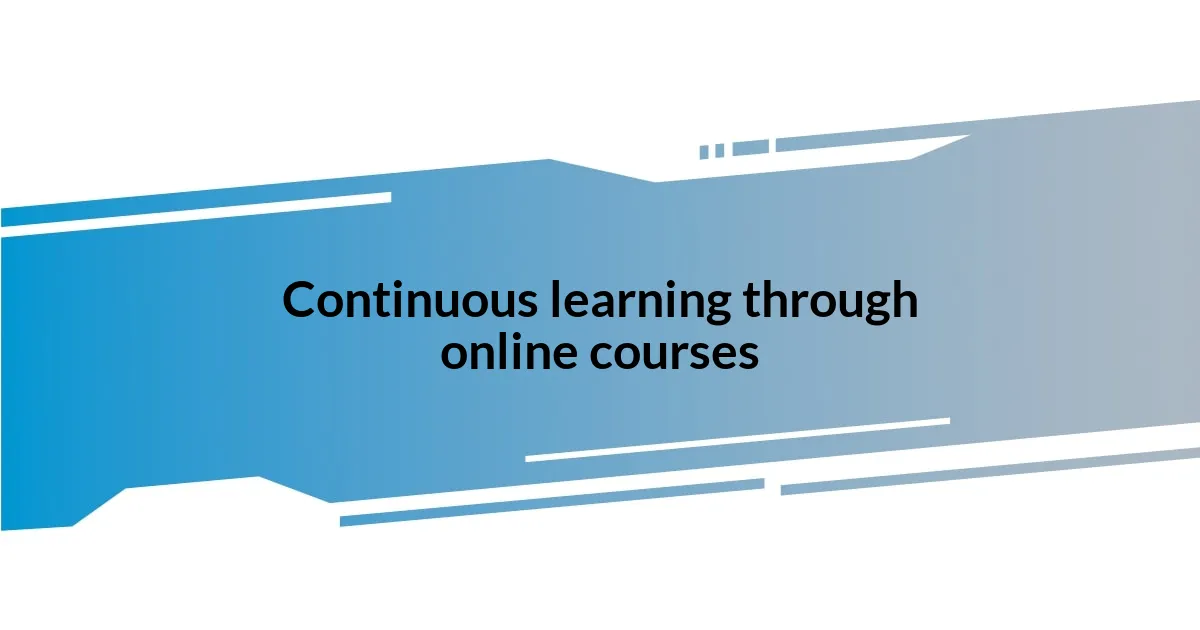
Continuous learning through online courses
Online courses have been my secret weapon for continuous learning in analytics. Whether it’s diving into machine learning or exploring advanced visualization techniques, I’ve found the structured format of these courses incredibly beneficial. I remember completing a course on predictive analytics that not only deepened my understanding but also directly influenced a project I was working on. The hands-on projects made the concepts feel real, transforming theoretical knowledge into practical skills. Isn’t it amazing how a well-crafted course can ignite your creativity?
I also appreciate the flexibility that online courses provide. With my hectic schedule, the ability to learn at my own pace has been a lifesaver. There was a time when I set aside Saturday mornings solely for an online data science course. Those dedicated hours not only brought me joy but also equipped me with new tools that I’m excited to implement. This self-directed approach not only fosters accountability but also allows me to revisit challenging topics as needed. Don’t you just love when you can hit the “pause” button and dive deeper into something that piques your curiosity?
Moreover, online platforms often feature diverse instructors who share their unique perspectives. I vividly recall a session led by a data visualization expert who opened my eyes to storytelling through data. Their passion was palpable, and it left me inspired to reframe the way I present my data insights. Following that course, I’ve consciously tried to incorporate narrative elements into my reports. Reflecting on this journey, I can confidently say that continuous learning through online courses has not only enhanced my technical skills but also enriched my overall approach to analytics. How can we resist the joy of growth that comes from such immersive experiences?